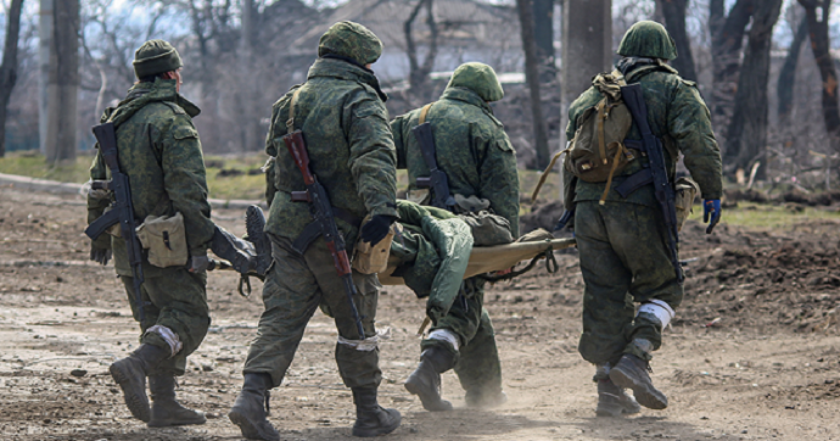Russian troops suffer 53 casualties per square kilometer in autumn offensive – ISW

Photo: Reuters
The Institute for the Study of War has reported significant casualties among Russian military forces in their autumn offensive in Ukrainian territory in 2024. Their analysis indicates an estimated 53 soldiers killed per square kilometer of captured land.
This is stated in the ISW report.
As analysts have pointed out, the Ministry of Defense of the United Kingdom has reported that the average daily casualties of Russian soldiers in November 2024 were at a record high of 1,523 per day.
In particular, a new maximum was recorded on November 28, when the number of losses exceeded 2,000 people per day. Personnel losses in November amounted to 45,690 people, the most significant monthly figure in the last five months.
Russian troops actively advanced to the west of the Donetsk region and part of the Kursk region, capturing about 839 square kilometers in November alone. The average rate of advance was 27.96 square kilometers per day.
During three months of active offensive operations — in September, October, and November 2024 — Russian troops lost 125,800 soldiers, capturing 2,356 square kilometers.
Losses per square kilometer remain incredibly high, which indicates the ineffectiveness of such operations.
That is, as the report notes, there are approximately 53 Russian military casualties per square kilometer of Ukrainian territory captured at this time.
ISW analysts note that such losses create significant pressure on the Russian economy:
- The Kremlin faces a dilemma: on the one hand, it needs to maintain military operations, and on the other, it must ensure economic stability.
- Labor shortages in key sectors of the economy are becoming increasingly noticeable as mobilization removes a significant portion of the working-age population.
"Russia's constrained labor pool is likely unable to sustain this increased casualty rate in the medium-term, and continued Western military support for Ukraine remains vital to Ukraine's ability to inflict losses at this rate," the experts stressed.
Experts believe that Russia is unlikely to be able to meet its needs in both the military and domestic economy. A prolonged offensive in 2025 will only exacerbate resource problems that have already begun to show themselves due to a shortage of workforce and rising inflation.
"The Kremlin's commitment to maintaining the theater-wide initiative in Ukraine and continuing to advance in eastern Ukraine has created dueling demands on Russia's labor pool. Additional efforts to increase Russian force generation rates risk further destabilizing the Russian economy as Russia continues to grapple with domestic labor shortages and rising inflation," the ISW noted.
Experts point out that Russians can either fight in Ukraine or work for the Russian Federation's domestic economy, but they cannot do both at the same time.
"The Kremlin is unlikely to sufficiently meet its needs for labor in both the military and Russia's domestic economy shortly, and additional months of intensified offensive operations in Ukraine in 2025 and beyond will only further compound Russian resourcing dilemmas," the analysts noted.
At the same time, the military adds, US President Joe Biden's commitment to provide the rest of the available American aid to Ukraine and to continue the regular provision of Western military assistance to Ukraine remains crucial to Ukraine's ability to:
- continue to defend itself against Russian offensive operations,
- inflict unacceptable losses on the Russian military in 2025.
Key ISW findings for December 5:
- The Kremlin is continuing to suffer significant human resources losses to make tactical advances in the western Donetsk region at the expense of Russia's ongoing war effort and the medium-term viability of the Russian economy.
- Russia's constrained labor pool is likely unable to sustain this increased casualty rate in the medium term, and continued Western military support for Ukraine remains vital to Ukraine's ability to inflict losses at this rate.
- Russian Chief of the General Staff Army General Valery Gerasimov undermined the Kremlin's information operation to portray Russia's November 21 Oreshnik ballistic missile strike against Ukraine as a defensive response to the US permitting Ukraine to conduct strikes in Russia with US-provided ATACMS missiles.
- Russian-North Korean military cooperation will likely intensify in the coming months following the formal commencement of their comprehensive strategic partnership agreement on December 4.
- Chechen Republic Head Ramzan Kadyrov continues to publicly position himself as a defender of migrants and Russian ethnic minorities in opposition to other senior Russian security officials, suggesting that senior Russian officials may be increasingly divided over Russian President Vladimir Putin's efforts to promote an inclusive Russian civic nationalism that ensures interethnic and interreligious harmony in Russia.
- Ukrainian forces recently advanced in the Kursk and northern Kharkiv regions, and Russian troops advanced in the Toretsk, Kurakhove, and Vuhledar directions.
- Russian forces are reportedly increasingly recruiting women for combat and logistics functions.

Putin's claims of economic stability at odds with reality – ISW

Russia accuses Ukraine of blocking prisoner exchange in attempts to discredit it – ISW

Rising Russian military spending may not boost military potential but may impact war against Ukraine – ISW



















































